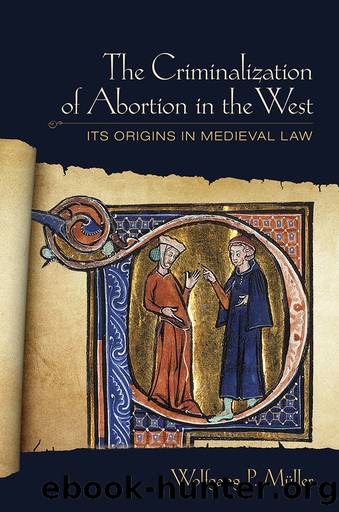THE CRIMINALIZATION OF ABORTION IN THE WEST by Wolfgang P. Müller

Author:Wolfgang P. Müller
Language: eng
Format: epub
Publisher: CORNELL UNIVERSITY PRESS
Published: 2017-05-29T00:00:00+00:00
Part of the fourteenth-century jury from Brno called for the defendant’s immediate release, in keeping with the view of many town inhabitants that reproductive choices were a personal matter. The remainder of John’s narrative indicates, however, that by 1353 the tide had begun to turn against traditional lay indifference concerning the fate of unwanted offspring. A good number of the sworn members, John pointed out, believed that the case represented a serious breach of the societal order, regardless of whether the casualty amounted to murder for hire or occurred short of interference by an outsider. The municipal record supplies several paragraphs with objections voiced by two groups of dissenters among the Schöffen. One of them had reminded jurors that the drowning of babies warranted the imposition of salutary penance by a spiritual confessor, just as the contracting and dissolution of marriages fell under ecclesiastical competency.8
The largest portion of John’s account was dedicated to the argument of a third party that commensurate punishment for the act would coincide with what “the Roman law” had stipulated. A woman guilty of having extinguished nascent life at any time following animation in the womb deserved to be executed for homicide. “If she aborts previously and within forty days from conception,” John went on, “she must be sent into exile.” Both execution and relegation were quoted as extant in legibus, among the norms to be found in Emperor Justinian’s sixth-century Corpus iuris civilis. In reality, they rested on interpretations offered half a millennium later by the medieval jurists. Almost word for word, the Schöffenspruch repeated the Bolognese glossa ordinaria, read at civilian schools alongside the principal authoritative passage, or sedes materiae, on questions of abortion (Dig. 47.11.4). With the Schöffen in their wake, the original authors of the gloss, Azo and Accursius, had furnished a canonized reinterpretation of ancient Stoic jurisprudence “according to the Mosaic law” (secundum legem Moysi), which in their estimate referred to the biblical reading of Exodus 21:22–23 as rendered by the Greco-Jewish Septuagint. Partisans of the rigorist view on the panel at Brno hence justified support for the death penalty by quoting academic communis opinio, in line with contemporary habits, under the disguise of imperial legislation.9 In addition, they tried to bring future decision makers onto their side, as John, the municipal scribe, was instructed to have the verdict preceded by a rubric that issued an ominous warning to prospective offenders. “In actuality [opere],” the text states, capital retribution “has not been inflicted upon the accused. Rather and for the time being [ad presens], the Schöffen have ordered that the sentence be put in writing and serve subsequent generations as a lasting reminder.”10
For all we know, posterity at Brno and in towns to the east where John’s collection was consulted did not heed the most intransigent of suggestions made by the jurors. Until 1500, no board of Schöffen is known to have passed a sentence of execution for the intentional slaying of unborn or newborn life. This means that the significance
Download
This site does not store any files on its server. We only index and link to content provided by other sites. Please contact the content providers to delete copyright contents if any and email us, we'll remove relevant links or contents immediately.
| Africa | Americas |
| Arctic & Antarctica | Asia |
| Australia & Oceania | Europe |
| Middle East | Russia |
| United States | World |
| Ancient Civilizations | Military |
| Historical Study & Educational Resources |
The Bomber Mafia by Malcolm Gladwell(1184)
Submerged Prehistory by Benjamin Jonathan; & Clive Bonsall & Catriona Pickard & Anders Fischer(1162)
Facing the Mountain by Daniel James Brown(1135)
The Dawn of Everything by David Graeber & David Wengrow(1112)
The Way of Fire and Ice: The Living Tradition of Norse Paganism by Ryan Smith(1033)
Wandering in Strange Lands by Morgan Jerkins(1018)
Driving While Brown: Sheriff Joe Arpaio Versus the Latino Resistance by Terry Greene Sterling & Jude Joffe-Block(1003)
Tip Top by Bill James(1002)
Evil Geniuses: The Unmaking of America: A Recent History by Kurt Andersen(1001)
Red Roulette : An Insider's Story of Wealth, Power, Corruption, and Vengeance in Today's China (9781982156176) by Shum Desmond(1000)
F*cking History by The Captain(969)
It Was All a Lie by Stuart Stevens;(942)
White House Inc. by Dan Alexander(906)
Evil Geniuses by Kurt Andersen(903)
Treasure Islands: Tax Havens and the Men who Stole the World by Nicholas Shaxson(880)
American Dreams by Unknown(860)
American Kompromat by Craig Unger(849)
The Fifteen Biggest Lies about the Economy: And Everything Else the Right Doesn't Want You to Know about Taxes, Jobs, and Corporate America by Joshua Holland(817)
The First Conspiracy by Brad Meltzer & Josh Mensch(812)
